The toddler launches himself towards me, arms thrashing, teeth bared. 'Sweetie, everybody is wearing their seat belts, look. Just let me do up the clip... ' Ear spitting screams followed by snarling as he tries to bite me. 'No mummy, mummy please, I don't want to take off. I want to GET OFF'.
We're heading for the penultimate stop on our journey following the grey whale migration. Our plane is full. My usually calm two-year-old is a banshee. It's cool in the cabin but sweat trickles down my back.
Glancing up as I fend off attacks from, and try to reassure, my small assailant, I see only men, of varying degrees of toughness. Heavy workboots, jeans, shaven heads, bulging tattooed muscles. All absolutely still. A guy in a checked shirt mumbles something several rows off. I can't hear it above my companion's roars.
The plane taxis and takes off. Seconds later he is sound asleep and my heart rate normalises. It's a short flight to Barrow, the most northerly town in the US, which teeters on the edge of the Arctic Ocean.
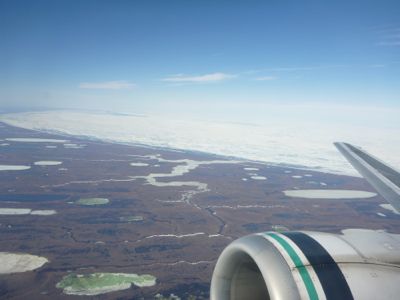
We make a quick stop at the Prudhoe Bay oil field. Now I understand why the plane is full of men. As the oil-workers file past me I apologize for the noise. Most of them nod or ignore me and carry on past but the checked shirt man stops. I cringe. 'That's exactly how every guy on the plane felt', he says smiling. Suddenly, instead of hostile strangers, I am surrounded by boys who want to go home and the toddler's reaction to the tension makes sense.
An Inupiat Welcome
I'm met at the airport with a huge hug that engulfs both of us. I've been here before, many years ago, for work. The toddler and I are staying a week, with the Inupiat Eskimo family that adopted me last time, Jeslie and Julia Kaleak.
Strictly speaking, I should have gone to a nearby village, Point Hope, for this leg of the migration. There's a grey whale count there. But I couldn't afford both and it was too good an opportunity to miss to say hi to my family.
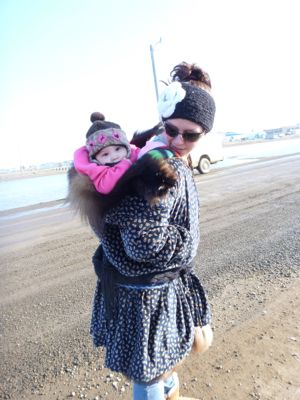
We drive home. Roads here are unpaved because it's difficult to build on the permafrost. The houses are mostly pre-fab. Yards are littered with motor-boats, skidoos, traditional seal-skin umiak boats, trucks, whalebone and walrus tusks. It's raw and beautiful.
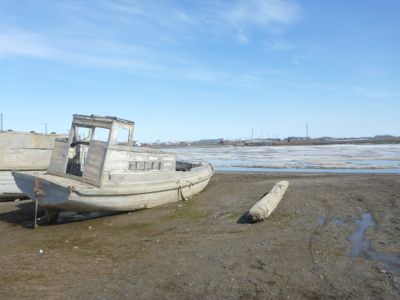
There are two reasons to come up here to the North Slope. Whales and oil.
The Inupiat have lived here for approximately 4,000 years. Surviving, in a world that is periodically engulfed by ice and darkness, because of their intimate knowledge of nature and of their main prey, the bowhead whale. The bowhead is endangered so they're allowed to kill a quota under rules on subsistence whaling.
European whalers arrived in the 1800s. Now, oil is the main draw for outsiders but the two don't mix well. The risks to the ecosystem involved in drilling here are immense.
As oil exploration continues its inevitable advance, the Inupiat insist that while big oil may be a necessity, unless bowhead whales are protected, their way of life will die. Inupiat culture cannot exist without the bowhead. I see the Inupiat as the voice of the whale. I love them for it. I'm an outsider though and I really don't know if my interpretation is shared, or if the voice is being listened to.
Ice, Ice, Ice
Last time I was here I camped with the Kaleak whaling crew on the sea ice, waiting for the bowheads to start migrating along the lead. None came close enough to catch that year and I spent days and days listening to them breathing as they swam past.
'Occasionally', one experienced hunter told me then, 'we see a grey'. With this fact cemented in my mind, I'm back, seeking their expert help.
First, there's catching up to do. I'm updated on reported sightings of a sasqwatch in a neighboring village, and retold stories of the little people, the Imminnauraq, who rescued someone lost in the snow by showing them the way home.
There are new babies to meet and sad news, the death of a grown-up son I knew. The toddler is given an Eskimo name, as I was on my first visit. We hang out at the playground, complete with walrus slide. 'Can we stay here for years mummy?' he asks. I want to say yes.
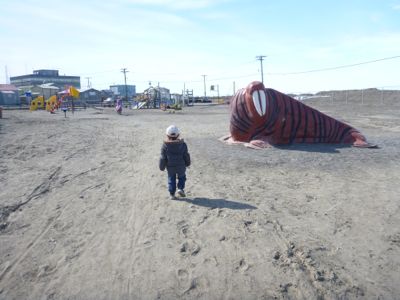
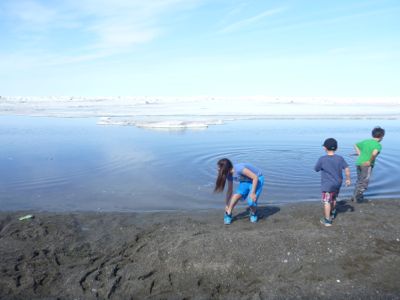
From the playground I can see that the sea ice is still right up against the shore. Bad news. No boating. No whale watching. Deep breaths. I call the local wildlife department. The member of staff who answers the phone offers to pick us up the day before I leave and talk to me about grey whales.
I'm slightly cheered by the news that greys are coming more and more into the bowhead feeding grounds. "They are out there now," he says, "we just can't see them because of the ice." I ask if it's possible to charter a plane. It is. But not on what remains of my bank loan.
A Link to Siberia
Our dinner that night is pizza with scientist friends, Anne Jensen and Glenn Sheehan. They tell me about the Diomedes, two islands in the middle of the Bering Strait between Alaska and Siberia. One is American, one Russian. The whales helped forge life-saving alliances there.
Before the collapse of the Soviet Union, Eskimos living on U.S. territory were able to deliver supplies to Yupik communities on the Chukchi Peninsula. Traveling by umiak because the seal-skin craft didn't show up on the Soviet radars. In their furs, officials couldn't tell them apart.
Once the Soviet Union collapsed, my friends tell me, the Yupik's economic safety net disappeared. The then-mayor of the North Slope Borough arranged for a generator to be airlifted to one of the Chukotka communities.
Hunting was now even more vital, the only way they could survive. The Borough authorities also flew a Yupik elder living in Chuckotka to the U.S., for an operation to remove his cataracts. He had hunted grey whales, a very difficult prey, in his youth. With restored sight he was able to teach young hunters the art.
The Ear of the Whale
Full of pizza and renewed faith in the magic of the greys, I head off for an early night before our outing with the wildlife expert. The next morning I'm ready and waiting. A truck rolls up at a neighbor's house. I go to check it out. The motor's running but there's no sign of the driver. It's chilly so after a few minutes I go back inside.
I don't want to seem pushy so I wait 45 minutes before calling the office. I get the secretary. My expert has chartered a plane to Point Hope for the day. He came to pick us up but couldn't see any sign of us, she says. My throat closes. I croak thanks and goodbye.
I imagine us, soaring over the sea ice, over my greys. We were so close. Why is nothing working? What am I doing chasing whales anyway? Who do I think I am? Doctor effing Doolittle?
"What's wrong mummy?": The toddler has left his dolphin jigsaw to investigate my sniffling and lays a hand on my arm. "Don't worry, you will feel better soon, everything will be OK mummy,' he says confidently. Shocked at the role reversal, I pull myself together, more or less.
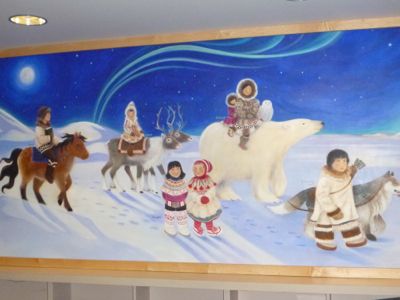
We enjoy the rest of our last day relaxing with our wonderful hosts. They don't know how to console me, this person from the other side of the world on a strange mission. They present me with the eardrum of a bowhead whale. I'd never get it through customs so ask them to keep it for me. Holding it to my ear like a seashell, I seek a message from the deep in the whispers.
We've one more stop planned, Kodiak Island. But I've given up on the whales. Barrow was my fail-safe, my best shot. I just want to go home now. Either that or stay here forever.
As we board the plane, the toddler chants his Eskimo name under his breath. Akootchook.